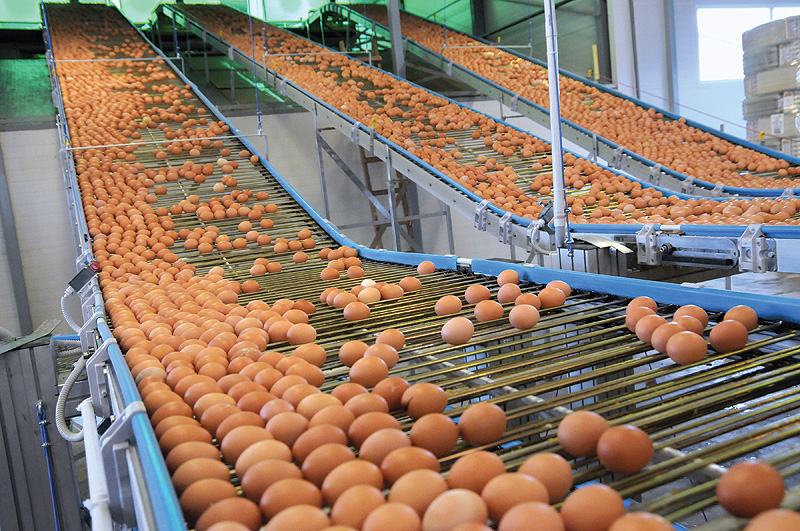
Balticovo
Cracking the market
Having invested substantially in its production technologies, leading egg producer Balticovo is looking to introduce more added value products to its portfolio
The origins of Latvia-based Balticovo can be traced back to 1972, when the company was first founded as a state-owned poultry factory operating under the name Iecava. Although the first laying hens were housed in 1973, the commercial egg production did not begin until 1975. It was in the early 1990s when the company first changed its name to Balticovo Ltd, however at present it operates under the stock company name Balticovo. Today, with an annual egg production volume of over 500 million, Balticovo is the leading producer of eggs and derivative egg products in northern Europe. Alongside this core production, Balticovo also has several sub-branches within its structure encompassing feed grain processing, production of compound feed, pullet rearing, processing of poultry manure, and provision of logistics services.

With approximately 70 per cent of all Balticovo egg products being sold outside of Latvia, it is clear that export makes up a large proportion of the business, with liquid egg, dried egg and boiled egg products, as well as eggs themselves, forming the majority of exports. Describing the company’s targeted markets, and key customer sectors, chairman Arnis Veinbergs says: “As well as our home market in Latvia, we also export to other Baltic countries, Scandinavian countries, Poland, Germany, France, Italy, Belgium. Hungary, Romania, the Netherlands, Hong Kong, and Japan. Our main customers are retail chains, food industry companies, catering, HoReCa sector, egg product production companies and distributors.” Using both its own and rented road vehicles, Balticovo ensures the delivery of its products to every customer, not only in Latvia, but also in other Baltic countries.
In terms of Balticovo’s product portfolio, the company offers a wide range of options such as a ten egg economic package, eggs with selenium, eggs with omega fatty acids, six egg package, dried eggs, liquid egg white, liquid egg yolk, liquid whole egg, and a series of free range eggs. This strategy maximises its market coverage by offering products to meet the different demands of the consumer. Recently Balticovo has branched into the sale of boiled egg products, intended for use in the HoReCa sector, delicatessen products, and direct consumption. Describing the process of introducing a new product onto the market, Arnis comments: “The reasons behind this development is to add further diversification to our product line, and to enable us to provide a value-added product. Although it is a new direction for us, in terms of it being the first time we have offered this product, the product itself is not new to the market. However I believe that the quality of our product and service, as well as the price, make us a strong competitor in terms of gaining market share.”
Other key developments within the business include major investment into its assets such as the introduction of the liquid egg plant in 2000. Following the introduction of the new European laying hen welfare requirements in 2004, Balticovo underwent a complete overhaul of its housing system, beginning with the construction of four new modern laying hen houses in 2005. “Since this time we have invested in an additional five new hen houses and a new egg grading and packing centre, which were formally opened in a ceremony on International Egg Day, October 9, 2009,” elaborates Arnis. “As a result of this we have a new poultry complex of nine modern laying houses with a total capacity of two million birds, and a egg grading and packing centre, which processes 180,000 eggs per hour.”

This vast production capacity and modern facilities are just two factors behind Balticovo’s commercial success, as Arnis highlights: “Our flexibility in the production of large quantities, and the fact that we are certified according to the International Featured Food Standard (IFS) for the grading and packing of consumer eggs, and the Global Standard for Food Safety (BRC) for grading and packing of consumer eggs, has helped to open doors to countries across northern Europe. These standards help guarantee the quality of our products and for our customers this is very important. We have also gained ISO 9001:2008, ISO 22000:2005, and ISO 31000, which includes risk management accreditation, so that we can analyse any possible risks at top management level and monitor them in-house.”
Although Balticovo’s product quality remains indisputable in the market, a position that benefits the business, recent external factors have resulted in fairly changeable market conditions. “At the moment it is quite difficult to forecast the egg price because it is very low across the whole of Europe,” explains Arnis. “One reason for this low price is the recent dioxin scandal in Germany, and as a consequence some countries in central Europe like the Netherlands, Germany and France, have reduced their egg consumption, so it is difficult to predict how long these effects will last. On the other hand the current egg prices do not currently cover production costs due to the high poultry feed prices, and this imbalance should push the egg prices up.”
Having operated in the industry for over 30 years, the values of quality, reliability, stability and safety remain as important to Balticovo today, as when the company first began production. With approximately 30 million euros invested over the last five years in up-to-date production techniques, Arnis concludes with how Balticovo still has other developments in the pipeline: “As a company we would like to be seen as one of the leading producers of high quality eggs, and egg products. One area we are looking to expand upon is to introduce more products with added value into our range. Another key initiative is the total mechanisation of the egg grading and packaging centre, so that there will be no employee in the chain from the laying hen to an egg in a carton.”